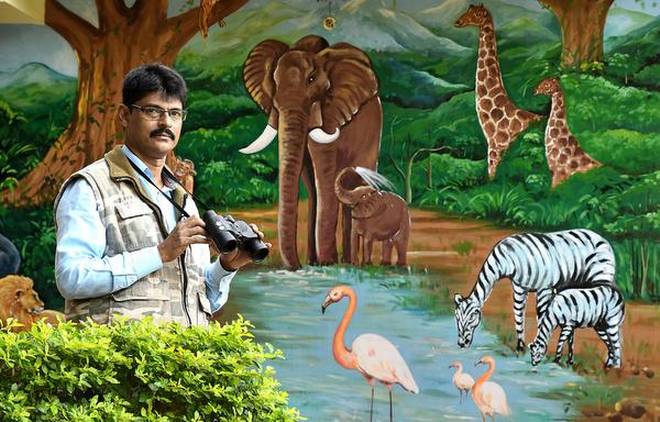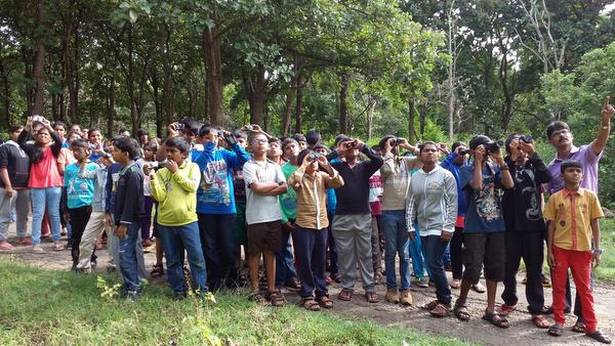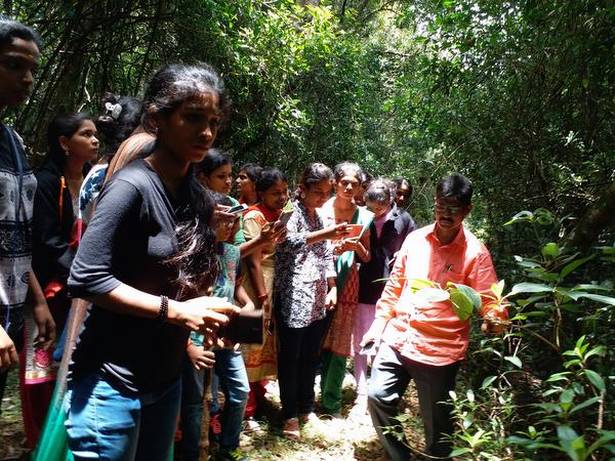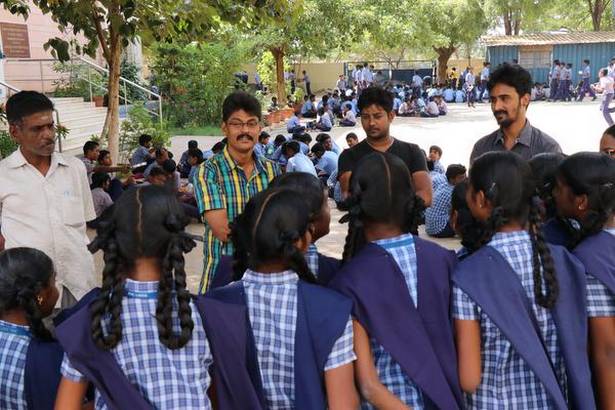Coimbatore, TAMIL NADU :
Wild life lover N.I. Jalaluddin is convinced that the way forward in conservation is through young people and he works tirelessly to sensitise them about forests, animals and birds
“My love for Nature started with birds, by observing the kaaka and kuruvi,” laughs N.I. Jalaluddin. As a school boy he was in Kollegal where his father was working. And, as he stared up at the sky, he was often beset by questions about the birds he saw flying. He wondered: ‘How do the migratory birds fly across continents and sometimes over 16,000 kms without any GPS, fuel, or driver?’.
That enthusiasm and curiosity combined with a trek to Mudumalai as a part of WWF camp fuelled his interest further. “I was a regular at BNHS Nature camps in Bandipur, Nagarhole and Masinagudi. And, I decided to talk about Nature and Wildlife among school students from then on.”
Today, his Nature Conservation Society that spreads awareness among students and the public has completed thousands of Nature camps and reached out to millions of students. Several awards have come his way with the latest one being the Best Service Award by the District Collector. “I work with eco-club students and take them on Nature walks in the Western Ghats,” he says. He educates them about the forests and the rich biodiversity it supports. Then, there is bird watching, and learning about mammals too. “I tell them how to identify pug marks, foot prints, and spoor of animals, and the importance of animal census.”
Jalaluddin talks excitedly about Project Kaliru, an initiative by Tamil Nadu Forest Department to save elephants. As a part of the project, he will cover 46 institutions, schools and colleges, and talk to them about elephants and wildlife. “The elephants lead the forests and set the terrain route for other animals. One of the prime objectives of Project Kaliru is to ensure that there is nil human -animal conflict. Did you know that the elephants as they migrate also bring a variety of plants from another region? The elephant dung has about 40 per cent of undigested food that includes seeds of a variety of fruits and vegetables.”
Awareness is the key, he stresses. “Tribals and animals have co-existed for generations. The conflict arises only in urban zones. In one year, there are over 15,000 deaths by road accidents while the death by human-animal conflict is about 30, which can be easily mitigated.” He is also making a documentary on elephant-human conflict called Wild Witness. “ It’s a dream project for me. One of my students, actor Aravind, who has attended my camps, is helping us out with the camera equipment. DFO Satish and Conservator of Forest S. Ramasubramaniam have been very helpful.” Jalaluddin is a regular at surveys of wildlife population with the forest department. He has rescued many species like snakes, birds, and animals used in illegal trade and handed them over to the forest department for release and rehabilitation. He has spoken out vociferously to save the wetlands. “When I raised my voice against cutting of trees for highway expansion, the authorities threatened to file a criminal case against me. But the Bar Association backed me and we fought it out .” He has intervened and stopped cutting of thousands of trees in the city by litigation, court stay orders, and through dialogues with higher officials. “Youngsters are the change makers, our hope. We have to start with them to care for Nature. Even awareness on banning plastics works better when you take it through them.”
Recently, Jalaluddin took a group of 150 students from Shree Sakthi College of Engineering on a trek to Valparai. “I told them to observe the scratching of animals on trees. It is one of the ways to understand that we are in tiger territory. Engineering colleges should also inculcate nature awareness. A watch tower or a check dam involves engineering skills.”
He recounts some thrilling experiences. “Once, we spotted a leopard in Mudumalai. Another time, we saw a herd of 13 elephants at a very close distance while on a trek at Theppakaadu. Luckily, there was a trench in between, much to the relief of the students,” he laughs. Along with students from Chandra Matriculation School, and Ramakrishna College for Women, he has spotted tigers in Bandipur, Thengumarhada…. “It’s a pity that some schools ignore this aspect of education. We live in the Western Ghats, the hotspot of bio-diversity. When I ask the students about our State animal (Nilgiri Tahr), bird ( Emerald Dove) flower ( Senkaanthal), or tree (palm tree), most them don’t know. A lot of animals, for example wild dogs or dhols have become a rare species now. I have spotted the Emerald Dove or Panchavarna pura so many times at Siruvani foothills. That is also very rare. In Tamil Nadu, we have four Project Tiger programmes in Anaimalai, Mudumalai, Satyamangalam and Kalakkad-Mundanthurai. We have Project Elephant too in Anaimalai and Mudumalai to care for and conserve the elephants.”
People fondly call him Kaatuvaasi or man of the jungle. He brushes it off with a smile, and says, “ I keep doing my work. We have to leave something for the future generation. I feel happy even if one student out of every 10 I talk to, plants a tree. He will in turn talk to another 10 people. Then, there is no stopping. That, is an achievement.”
Awareness programmes
Banning plastic bags, film shooting in reserve forests
Conducting awareness drives through rallies, photo exhibitions and workshops in schools
Supporting the forest department in mitigating human-animal conflict by dialogues with affected villagers
Awarding schools and individuals who contribute to a healthy eco-system
source: http://www.thehindu.com / The Hindu / Home> Sci-Tech> Environment / by K. Jeshi / January 01st, 2018












